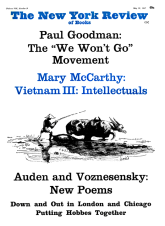In response to:
A Miltonic Sonnet for Mr. Johnson, on the Occasion of His Refusal of Peter Hurd's Official Portrait from the April 6, 1967 issue
To the Editors:
It appears that Mr. Richard Wilbur was confusing “Miltonic” and “Petrarchan” in the title of his interesting sonnet [NYR, April 6].
The end of the eighth line of Mr. Wilbur’s poem shows a definite break or pause in the sense and syntax which is characteristic of the Petrarchan sonnet. The opposite is true of several of Milton’s sonnets—eighteen of the twenty-four listed by Pattison—where the sestet runs on with no division of thought between it and the octet: hence the name “Miltonic sonnet,” which cannot apply to Mr. Wilbur’s poem except in a meaning I am sure he does not intend.
Tom Burns Haber
Department of English
The Ohio State University
Columbus, Ohio
Richard Wilbur replies:
Professor Haber is certainly right in saying that Milton’s Petrarchan sonnets often violate the form’s conventional divisions, great and small. If that were to be the sole criterion, as in some books of reference it is, then Paul Goodman’s slant-rhymed Petrarchan sonnet in the April 20 issue would qualify as Miltonic, owing to its broken eighth line, and mine would not. Yet of Milton’s sonnets written in English I count nine, at least, which seem to me to acknowledge the octave sestet break, and to begin the sestet with a turn or development of the thought. Sonnet X, for example, devotes the intact octave to Sir James Ley, and the sestet to his daughter’s worthiness of him, while at the same time the argument is fluidly continuous and expressed in a single sentence. I risked calling my poem “Miltonic” because it employed the sonnet for a public subject (as in Milton’s poems to Vane or Cromwell), because it used Milton’s chosen Petrarchan scheme, and because its one sentence struck me as an unbroken thought. Actually, the apparent “break” after the octave is spanned by suspended grammar (as in Milton’s Sonnet X), the “you” of address having been deferred until the sestet.
This Issue
May 18, 1967



